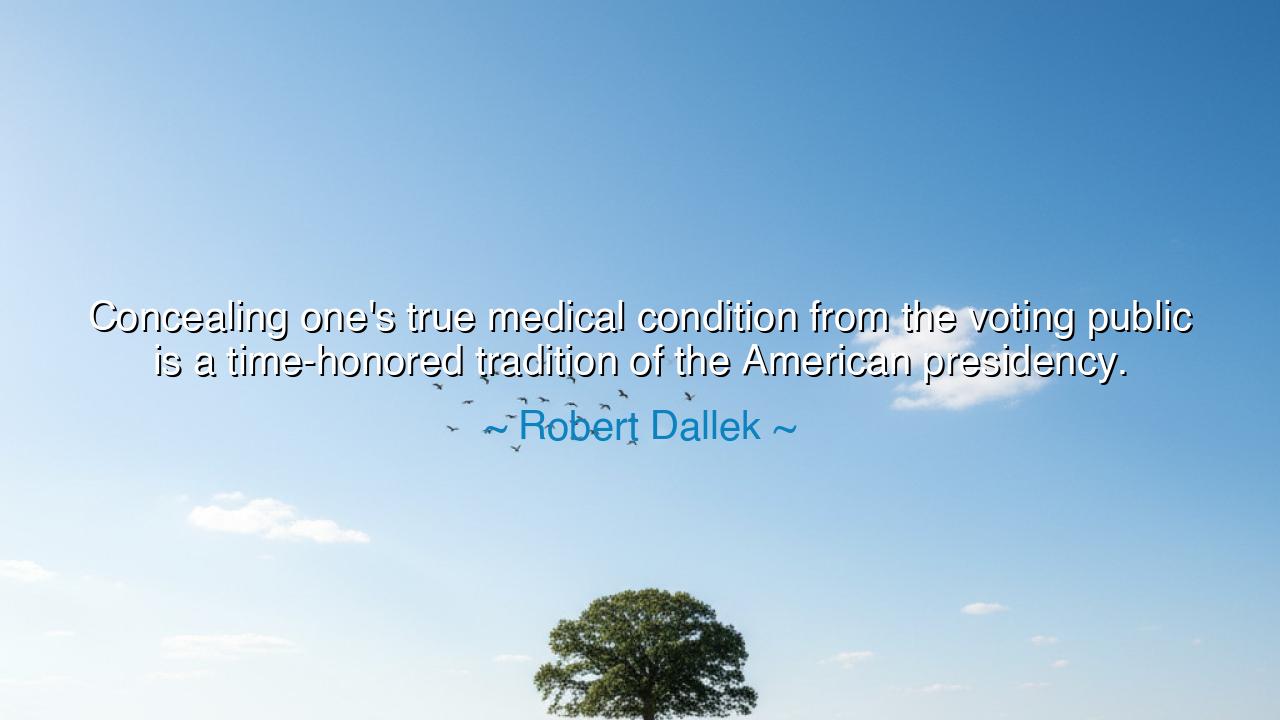
Concealing one's true medical condition from the voting public is
Concealing one's true medical condition from the voting public is a time-honored tradition of the American presidency.






When Robert Dallek declared, “Concealing one’s true medical condition from the voting public is a time-honored tradition of the American presidency,” he spoke not merely as a historian but as a seer gazing into the paradox of power. Beneath his calm observation lies a truth as old as leadership itself — that those who bear the mantle of authority often hide their frailty, fearing that truth might undo the faith of the people. In his words we hear the echo of the ancients: that kings, emperors, and presidents alike have worn the armor of illusion, lest the sight of their wounds shake the pillars of their reign. It is a statement at once tragic and wise — a reflection on the cost of appearances, the burden of expectation, and the quiet suffering of those who lead nations.
The American presidency, though young by the measure of history, has already written its share of secrets in invisible ink. Dallek, as a historian, knew these shadows well. His words remind us that behind the shining portraits of presidents lie the unseen battles of the body — trembling hands, failing hearts, minds worn thin by illness and exhaustion. For to admit weakness in a world that worships strength is to risk the throne of trust itself. Thus, concealment becomes not just a strategy, but a survival instinct — one as ancient as the crown and as modern as the ballot.
Consider the tale of Franklin D. Roosevelt, whose body was ravaged by polio, leaving his legs paralyzed. Yet before the eyes of the nation, he stood tall — not through deceit, but through determination. He refused to be seen as broken. With steel braces hidden beneath his trousers and aides to steady his steps, he walked before the cameras, smiling with the warmth of confidence. His illness was a secret carefully guarded, for he knew the people of his time would not yet accept a leader who appeared weak. And so, his concealment became his armor — protecting not his pride, but the hope of a nation trembling through depression and war. Dallek’s words find their roots in such moments, when the veil between truth and perception became the thin fabric holding a nation together.
Yet the ancients, too, knew this truth. Alexander the Great, wounded many times in battle, hid his injuries from his soldiers so they might never see their god-king falter. When his chest was pierced by an arrow, he demanded to be carried before his troops so they might know he lived. For a leader’s health is not his alone — it is bound to the morale of his followers, to the faith of the governed. Thus, from the marble halls of ancient empires to the shining domes of Washington, the concealment of weakness has always been part of the dance between ruler and ruled — a fragile balance between truth and necessity, honor and fear.
But Dallek’s insight is not merely an account of deceit; it is a mirror held up to the soul of the people. For if leaders hide their wounds, it is often because the people demand perfection. We, the governed, prefer the illusion of invincibility to the honesty of imperfection. We long for heroes, not humans; gods, not mortals. And thus, we become co-authors of the lie. The tradition of concealment persists not because the ruler desires deception, but because the nation desires certainty. And in that desire, both ruler and ruled become prisoners — bound by the myth of flawless strength.
The lesson, then, is not to condemn those who hide their pain, but to understand them. Leadership, in any age, is a sacred burden — to carry the hopes of millions while silencing one’s own cries. But a wise people must learn to honor truth over image, and compassion over perfection. The time must come when a leader can be frail and still be followed, when vulnerability is seen not as weakness but as humanity. For only then can the covenant between people and power be made whole again.
So remember this, O listener of the ages: do not fear the cracks in the crown, for through them the light of truth may shine. A leader who hides his pain is not a villain but a mirror of our own expectations. Let us, therefore, learn to look with gentler eyes upon those who guide us. Demand not gods, but good hearts; not illusions, but integrity. For when truth is honored above appearance, the realm — be it a nation or a home — stands firmer than ever before. And as Dallek reminds us, what is “time-honored” need not be eternal; tradition may yield to wisdom, and concealment may give way, at last, to truth.






AAdministratorAdministrator
Welcome, honored guests. Please leave a comment, we will respond soon